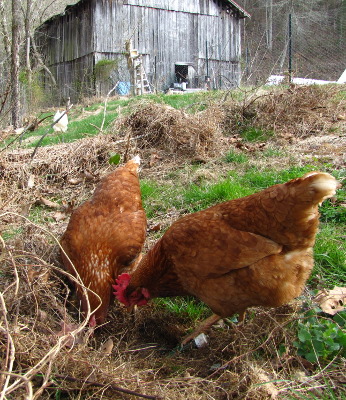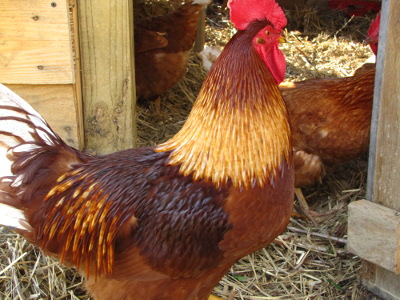
Developing the perfect pastured chicken breed
 If you want your chickens to
get the majority of their food from pasture, they need to be alert,
intelligent foragers willing to scratch for their supper instead of
waiting by the food trough. A century ago, the common backyard
chicken probably fit the bill, but nowadays, chickens are primarily
bred for show qualities or to be efficient converters of corn and
soybeans to eggs and meat. After extensive searching through the
literature, I decided that if I wanted the best pastured chicken breed,
I'd have to develop it myself.
If you want your chickens to
get the majority of their food from pasture, they need to be alert,
intelligent foragers willing to scratch for their supper instead of
waiting by the food trough. A century ago, the common backyard
chicken probably fit the bill, but nowadays, chickens are primarily
bred for show qualities or to be efficient converters of corn and
soybeans to eggs and meat. After extensive searching through the
literature, I decided that if I wanted the best pastured chicken breed,
I'd have to develop it myself.
Over the last four
years, we've raised four breeds of chickens and they've all had widely
divergent foraging abilities. Last fall, we slimmed down the
flock considerably, deleting every bird who wasn't a lean, mean
foraging machine (and a good egg-layer to boot), and we're now down to
three Golden Comets, a hybrid rooster
(Golden Comet/Rhode Island Red), and a White Cochin who was spared the chopping
block solely because of her maternal abilities. My goal this year
is to get our cochin to hatch some homegrown eggs to see what sort of
hybrids we come up with. We'll eat the cockerels and keep several
of the pullets to renovate our aging laying flock. I also hope to
find at least one more hen who hasn't had broodiness bred out of her so
that we won't be putting all of our chick-starting eggs in one basket
(or is that nest box?)
 Before the Cornish Cross came
on the scene in the middle of the
twentieth century, a flock like the one I outline above was the
norm. However, we quickly became spoiled by the fast growth and
big breasts of these hybrid chickens, and no one is willing to go back
to eating light-weight cockerels, even if they do have a much higher
potential for getting more of their nutrition from scavenged
food. For all I know, Mark and I (both raised on supermarket
chickens) will be just as squeamish and will return to mainstream
broilers, but I hope we can work around chickens with more leg meat
than breast meat and slower growth. I'll be sure to keep you
updated on growth rates, feed costs, and taste tests as this year's
experiment progresses.
Before the Cornish Cross came
on the scene in the middle of the
twentieth century, a flock like the one I outline above was the
norm. However, we quickly became spoiled by the fast growth and
big breasts of these hybrid chickens, and no one is willing to go back
to eating light-weight cockerels, even if they do have a much higher
potential for getting more of their nutrition from scavenged
food. For all I know, Mark and I (both raised on supermarket
chickens) will be just as squeamish and will return to mainstream
broilers, but I hope we can work around chickens with more leg meat
than breast meat and slower growth. I'll be sure to keep you
updated on growth rates, feed costs, and taste tests as this year's
experiment progresses.
| This post is part of our Chicken Pasture lunchtime series.
Read all of the entries: |
Want more in-depth information? Browse through our books.
Or explore more posts by date or by subject.
About us: Anna Hess and Mark Hamilton spent over a decade living self-sufficiently in the mountains of Virginia before moving north to start over from scratch in the foothills of Ohio. They've experimented with permaculture, no-till gardening, trailersteading, home-based microbusinesses and much more, writing about their adventures in both blogs and books.
Want to be notified when new comments are posted on this page? Click on the RSS button after you add a comment to subscribe to the comment feed, or simply check the box beside "email replies to me" while writing your comment.

I'm trying to develop my flock along similar lines to you.
The breed I'm using as the basis of my flock is the Australorp. It's an Australian breed, well-suited to local conditions and renowned as an excellent egg-layer. The egg-laying world record is supposedly held by an Australorp, at 364 eggs in 365 days under official Australian trapnest testing.
Developed as a meat-and-eggs breed, males weigh 8.5 pounds, cockerals 7.5 pounds, hens 6.5 pounds and poulets 5.5 pounds.
From my notes: "It was the egg laying performance of Australorp chickens which attracted world attention when in 1922 - 1923 a team of six hens set a world record of 1857 eggs at an average of 309.5 eggs per hen for a 365 consecutive day trial. It must be remembered that these figures were achieved without the lighting regimes of the modern intensive shed."
We haven't eaten any Australorps yet (still too young).
Like you, I have a mixed flock. The Brahmas and their cross-breed daughters are making excellent mothers and are reasonable layers (not great, though). So they'll provide incubation and chick-raising.
The Australorps are keen foragers, even though they're still fairly young, so I have high hopes for them.
Australorps are on my short list, and I might add some later to hybridize with my girls. I had some several years ago (before I got into pondering foraging abilities) and was impressed, and your description sure sounds tantalizing! I'll need fresh blood at some point before too long because I don't want too much inbreeding. I'm also thinking of swapping our broody variety --- might try Brahmas there, or Cuckoo Marans (which Harvey Ussery uses.)
I hope you'll keep us updated on your breeding experiments!
They are the ultimate pasture chicken. They have great genetic diversity, prefer foraging all day long, very broody, evade predators well, good flyers, lay year round, up to 200 per year. Medium sized bird and egg. They are supposed to be tasty too. And they are curious friendly chickens. We have a lot of predators and we haven’t lost any after the first couple of months where they had to learn what to look out for.. bald eagles, hawks, osprey, owl, coyote, fox, raccoon and mink can all be found here. They are endangered and genetically unique so you really need to commit to not mixing them with other chicken breeds however.